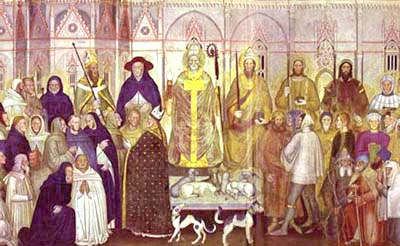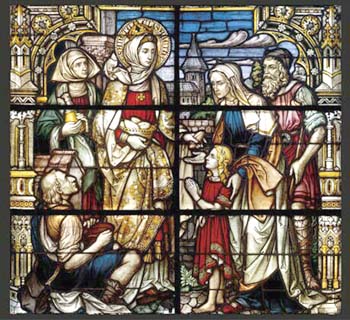 |
Socio-Political Issues
Regarding Papal Encyclicals
Why Are Distributist Leaders Misleading
Their Audience about Capitalism?
Patrick Odou
I am not an expert on Distributism, but I am trying to catch up with the principal authors of this current of thought. I have read over a dozen works of their main thinkers and I am noticing lacunas in their essential position.

It is still an enigma why the authors of Distributism quote partially from the papal encyclicals.
Above a portrait of Fr. Vincent McNabb. |
A basic thesis of the Distibutists is that there are two great social evils – Capitalism and Communism – and they pretend to present a solution that, in their view, is equidistant from both.
There are many things that are vague in the Distributist doctrine, but I will leave those for another occasion. Here, I just want to analyze one point: their opposition to Capitalism and, by extension, to the wealthy class in society.
To give basis to their accusation against Capitalism, they quote repeatedly – and almost exclusively – some texts from two Encyclicals: Rerum novarum by Pope Leo XIII and Quadragesimo anno by Pope Pius XI. One of the most quoted texts they use when they speak of Capitalism is:
“A small number of very rich men have been able to lay upon the teeming masses of the laboring poor a yoke little better than that of slavery itself” (Rerum novarum, n. 3).
This quote appears in almost every Distributist work I have encountered. (1) It is repeated over and over to “justify” their anti-Capitalism attack. The insistent repetition of such quotes taken outside the context of the Encyclicals leads one to think that the two Pontiffs made a kind of "Syllabus" that solemnly condemned Capitalism as a regime that is intrinsically perverse.
However, this and other texts were written in Rerum novarum and Quadragesimo anno not to condemn the essence of Capitalism, but to correct abuses that Liberalism introduced into it and caused it to produce harmful social consequences.
The Church’s position concerning Capitalism
There is nothing wrong in itself with Capitalism, the system according to which a man owns capital and rents the services of workers. The two mentioned Papal Encyclicals clearly affirm this (2).
A famous text of Leo XIII defended Capitalism, and stated that both capital and labor have the right to exist in a Catholic society. In Rerum novarum he preached harmony between capital and labor rather than a suppression of the regime of capital. After defending the right of private property against the attacks of the Socialists, Leo XIII emphatically affirmed:
“The great mistake made in regard to the matter under consideration is to take up with the notion that class is naturally hostile to class, and that the wealthy and the working men are intended by nature to live in mutual conflict. So irrational and false is this view that the direct contrary is the truth. Just as the symmetry of the human frame is the result of the suitable arrangement of the different parts of the body, so in a State is it ordained by nature that these two classes should dwell in harmony and agreement, so as to maintain the balance of the body politic. Each needs the other: capital cannot do without labor, nor labor without capital. Mutual agreement results in the beauty of good order, while perpetual conflict necessarily produces confusion and savage barbarity.
“Now, in preventing such strife as this, and in uprooting it, the efficacy of Christian institutions is marvelous and manifold. First of all, there is no intermediary more powerful than religion – whereof the Church is the interpreter and guardian – in drawing the rich and the working class together, by reminding each of its duties to the other” (n. 19).
In Quadragesimo anno Pope Pius XI commented on this very paragraph and made the Catholic doctrine on capital and labor even more explicit. These were his words:
“In the application of natural resources to human use, the law of nature, or rather God’s will promulgated by it, demands that right order be observed. This order consists in this: that each thing have its proper owner. Hence it follows that unless a man is expending labor on his own property, the labor of one person and the property of another must be associated, for neither can produce anything without the other. Leo XIII certainly had this in mind when he wrote: ‘Neither capital can do without labor, nor labor without capital’ (n. 19). Wherefore it is wholly false to ascribe to property alone or to labor alone whatever has been obtained through the combined effort of both, and it is wholly unjust for either, denying the efficacy of the other, to arrogate to itself whatever has been produced” (n. 53).

Society should be unequal and follow a hierarchy that is a reflection of God. Above, a picture of the harmonic and hierarchical distribution of classes of Church and State - Andrea da Firenze, 1365-68 |
Pius XI referred specifically to Capitalism – the “economic system wherein some provide capital while others provide labor for a joint economic activity” (n. 100) – as a non-condemnable system. He taught:
“With all energy Leo XIII sought to adjust this economic system according to the norms of the right order; hence it is evident that this system is not condemned in itself. And surely it is not of its own nature vicious. But it does violate right order when capital hires workers, that is, the non-owning working class, with a view to and under such terms that it directs business and even the whole economic system according to its own will and advantage, scorning the human dignity of the workers, the social character of economic activity and social justice itself, and the common good” (n. 101).
These texts prove that, according to Catholic doctrine, Capitalism is not bad in itself. It is a system that must be corrected of its frequent defects in order to be Catholic and help to establish a just social order.
Now some questions come to mind: Why is it that so many writers and followers of Distributism do not even mention the true and balanced position of the Church concerning Capitalism? Why do they pretend that the Church condemned Capitalism as intrinsically evil, when this is not true?
But there is more. In Quadragesimo anno Pius XI also spoke of the right of the rich to increase their wealth, which is also the opposite of what has been often spread by the Distributists. The Pontiff taught:
“Those who are engaged in producing goods, therefore, are not forbidden to increase their fortune in a just and lawful manner; for it is only fair that he who renders service to the community and makes it richer should also, through the increased wealth of the community, be made richer himself according to his position, provided that all these things be sought with due respect for the laws of God and without impairing the rights of others and they be employed in accordance with faith and right reason” (n. 136).
And there are more questions that must be asked as I read the Distributists: Why is it that whoever approaches them is induced to hate the natural elites of society? Why does Distributism see the rich as a kind of thief of society, when traditional Catholic doctrine clearly teaches the opposite?
After combating abuses of Capitalism, Pius XI stressed the role of the rich class for the common good of society. He affirmed:
“Therefore, with all our strength and effort we must strive that at least in the future the abundant fruits of production will accrue equitably to those who are rich and will be distributed in ample sufficiency among the workers – not that these may become remiss in work, for man is born to labor as the bird to fly – but that they may increase their property by thrift, that they may bear, by wise management of this increase in property, the burdens of family life with greater ease and security, and that, emerging from insecure lot in life in whose uncertainties non-owning workers are cast, they may be able not only to endure the vicissitudes of earthly existence but have also assurance that when their lives are ended they will provide in some measure for those they may leave after them” (n. 61).

The Catholic law of charity. Above, St. Elizabeth of Hungary distributing alms and bread to the poor. |
Here Pius XI mentioned that the rich should “distribute” their wealth among the workers. How should this be done? Certainly, the first thing to do is to give each worker a just salary – “his great and principal duty is to give every one what is just” (Rerum novarum, n. 20). But then, there are still social needs. What criterion did Leo XIII present for the wealthy to follow in order to ease these necessities? He asked this question and then answered it:
“How must one’s possessions be used? The Church replies without hesitation in the words of the same holy Doctor [St. Thomas of Aquinas]: 'Man should not consider his material possessions as his own, but as common to all, so as to share them without hesitation when others are in need. Whence the Apostle with 'Command the rich of this world … to offer with no stint, to apportion largely'' (Summa theologiae, II-II, q. 66, art. 2, answer). True, no one is commanded to distribute to others that which is required for his own needs and those of his household; not even to give away what is reasonably required to keep up becomingly his condition in life, ‘for no one ought to than becomingly.’ But, when what necessity demands to be supplied, and one’s standing fairly taken thought for, it becomes a duty to give to the indigent out of what remains over. ‘Of that which remaineth, give alms.’ (Luke 11:41 ) It is a duty, not of justice – save in extreme cases – but of Christian charity, a duty not enforced by human law” (Rerum novarum, n. 22).
Therefore, the “distributism” that the Catholic Church teaches is quite different from the one being spread recently in the United States. Besides the precept of justice of giving the just wage to the worker, the Popes taught that the law that commands giving to the poor is the law of charity, and not human justice, as has often been spread by Socialists, Progressivists and Distributists. Except in the case of extreme necessity, no human law should oblige a person to give from his superfluous. It is a duty of charity which is, nonetheless, very serious because one will answer for it before God.
Which way for society?
Toward which type of society should Catholics tend? Should they build a hierarchical society wherein capitalists and workers, rich and poor (and all classes) live in harmony? Or should they abolish Capitalism and aim towards a “Distributist” society consisting of small family-sized properties without elites?
In opposition to the Distributist authors who spoke of the end of Capitalism and the coming of a new social reality, Pius XI sought a future of social harmony among the large proprietors and workers, the rich and the poor. Indeed, he said:
“For then the rich and others in positions of power will change their former indifference toward their poorer brothers into a solicitous and active love, listen with kindliness to their just demands, and freely forgive their possible mistakes and faults. And the workers, sincerely putting aside every feeling of hatred or envy which the promoters of social conflict so cunningly exploit, will not only accept without rancor the place in human society assigned them by Divine Providence, but rather will hold it in esteem, knowing well that everyone according to his function and duty is toiling usefully and honorably for the common good and is following closely in the footsteps of Him Who, being in the form of God, willed to be a carpenter among men and be known as the son of a carpenter” (n. 137).
So, the ideal toward which Leo XIII and Pius XI directed their social Encyclicals Rerum novarum and Quadragesimo anno was one that would renew and correct Capitalism. It is quite a different goal from that being presented by the leaders of Distributism.
I am limiting myself to just some texts of the two social Encyclicals most quoted by Distributists. There are many more papal documents that I have at hand, but I did not consider it necessary to call them to the stage. I believe that what I have presented is sufficient to destroy the false impression that the Church ever condemned Capitalism as a bad system in itself.
I could not end this article without asking these final questions:
Why are Distributists spreading amputated texts of these social Encyclicals? Is it mere naiveté? Is it because they did not read the Encyclicals? Or is it to convince their audience that they are Catholics when, in reality, they are Socialists?
1. For Instance:
• Fr. Vincent McNabb uses this quote in the following works: The Church and the Land, p. 115; Does the Church Protect Work People? p. 2; The Evil of Poverty, p. 5; St. Thomas Aquinas and Law, p. 17.
In Old Principles and the New Order, McNabb makes other statements that demonstrate his erroneous conception of Capitalism: Capitalism is “the concentration of wealth and economic power in the hands of a few (rightly condemned by the Rerum novarum)” p. 86; “We are getting now that control of everything by a few – Capitalism.” p. 118.
• Herbert Shove uses this quote in Distributist Perspectives as an opening for his article "The Growth of Industrialism," p. 50.
• Harold Robbins uses it in The Sun of Justice, pp. 25, 101.
• Eric Gill uses it in the following works: Songs Without Clothes, preface by Fr. Vincent McNabb, pp. 3, 24, Mass for the Masses, p. 16.
2. I am quoting from the English version of the Encyclicals available on the Vatican website.

Posted November 28, 2005

Related Topics of Interest
 A Distributist Manifesto Strongly Spiced With Communism A Distributist Manifesto Strongly Spiced With Communism
 Socialism and Distributism in Catholic Clothing Socialism and Distributism in Catholic Clothing
 Eric Gill, a Precursor of Vatican II Eric Gill, a Precursor of Vatican II
 Eric Gill: the Pedophile Founder of Distributism Eric Gill: the Pedophile Founder of Distributism
 Other Moral Pearls of Eric Gill Other Moral Pearls of Eric Gill
 A Torrent of Pros and Cons on Eric Gill, a founder of Distributism A Torrent of Pros and Cons on Eric Gill, a founder of Distributism

|
Social-Political | Hot Topics | Home | Books | CDs | Search | Contact Us | Donate

© 2002- Tradition in Action, Inc. All Rights
Reserved
|
 |
|